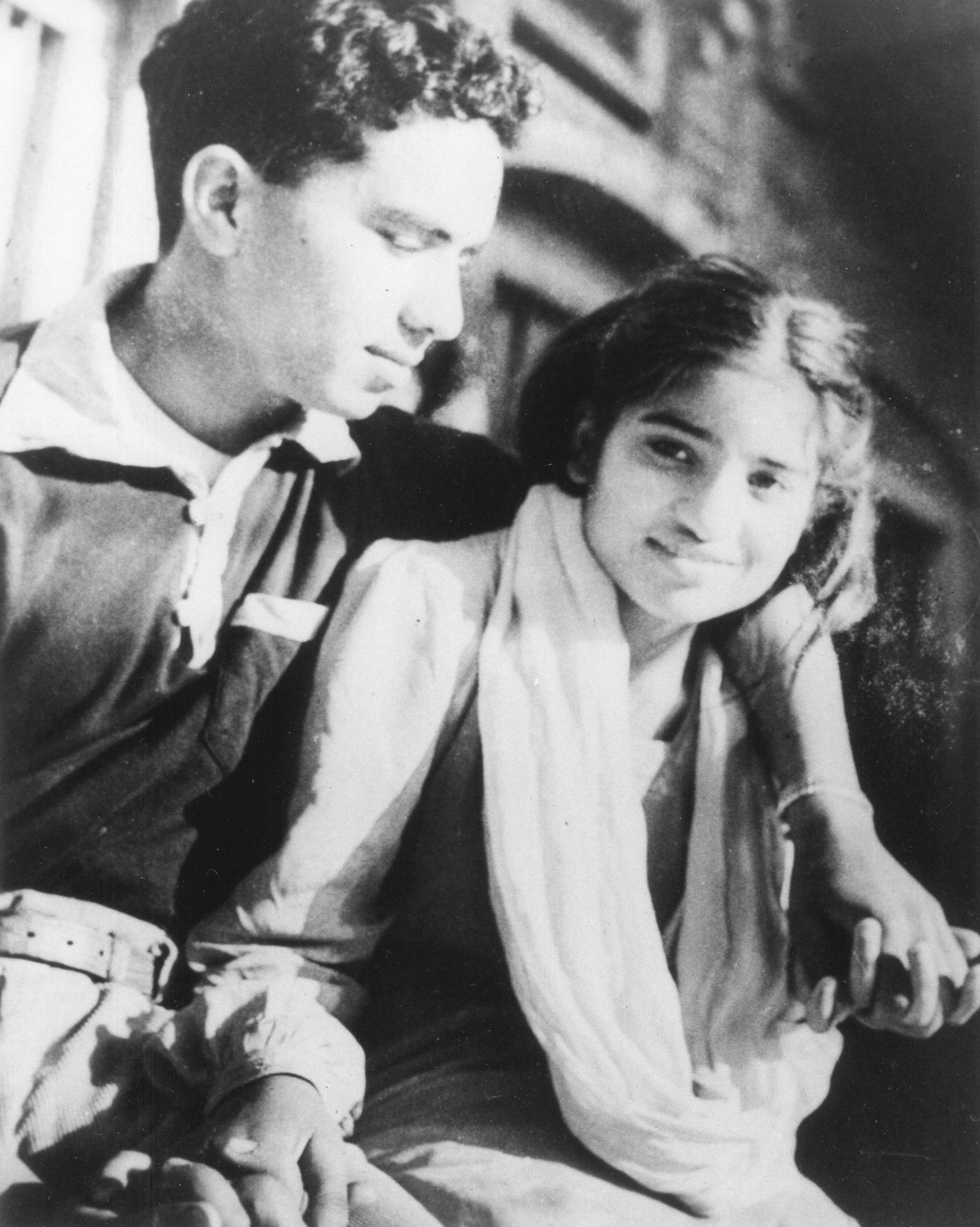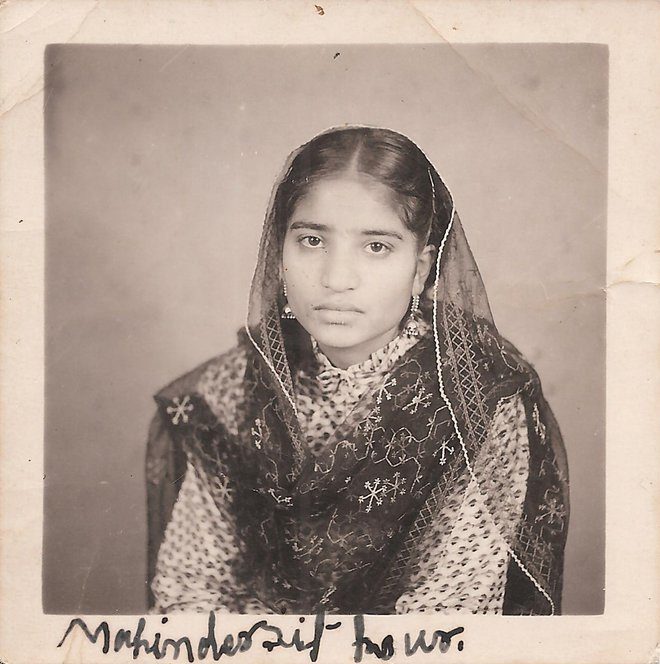Mohinderjit Kaur Thiara
Mohinderjit Kaur Thiara (born on January 5, 1937) has lived a remarkable life. After her birth in Burma, she grew up in Iran before returning to Punjab as a teenager to get married. In 1954, she joined her husband, Harsev Singh Thiara, and his family on their peach farm just north of Yuba City, making her one of the earliest Punjabi women to settle in the area. Outspoken, unconventional, and fearless, Mohinderjit produced a CD of love songs that she composed. To date, she is the only woman to serve as President of a Yuba City Gurdwara.
Her father, Udham Pal Singh, loved adventure. During the First World War, he served as a railway station master in Iraq. In the 1930s, he moved his family to Burma to work as a lineman for the Burmah Oil Company. During World War II, his father and an elder sister spent one month walking from Burma to Punjab. Shortly after, Udham secured a contract to work as a foreman for the British-owned Anglo-Iranian Oil Company in Abadan, Iran near the coast of the Persian Gulf. Abadan was the world’s largest oil refinery in 1945. He and his family lived in Iran for 9 years until the nationalization of Iran’s oil industry in 1951 forced them to leave the country. Afterwards, he and his wife remained in his ancestral village in Punjab. According to his son, Mohinder Singh Ghag, his father started a Gurdwara everywhere he lived overseas.

Mohinderjit with her husband, Harsev, is in the village of Harkowal, Hoshiarpur district, Punjab, 1954.
Mohinderjit Thiara singing devotional Punjabi songs, Live Oak, CA, April 15, 2021.
Kartar Kaur Thanderi, Mohinderjit’s mother, was a dominant force in the family. According to her brother, “whatever we are is due to my mother. She had that much influence.”* She was highly intelligent and eager to advance her family. Her tall, elegant frame was often draped in a sari or a fashionable Punjabi suit. A shrewd businesswoman, she made the decisions in selecting sites for land acquisitions for the family. Unusual for a woman of her time, she insisted that her daughters and sons be treated equally. She insisted that all of her children should receive an education and that all learn to play the harmonium to perform devotional music.
Mohinderjit’s mother also played a public role in community life. She was a vocal advocate for women’s education and she opposed the dowry system. In her village, she formed a women’s committee to address local women’s issues (such as social problems related to men’s alcohol consumption) and to make improvements in her community (cleaning, adding services to residents, etc.). She also helped improve the local Gurdwara sahib through fundraising. The local men who were inebriated would not dare to make any noise in front of her home.
According to her relatives, Mohinderjit inherited many of her mother’s personality traits. She is a natural leader who speaks her mind and makes many of the financial decisions in her family.
Mohinderjit spent her childhood and adolescence in four countries — Burma, Iran, India, and the United States. She earned a fifth grade education, and learned Farsi, and a little Burmese in addition to Punjabi, Hindi and English. In 1951, she returned to Punjab to marry Harsev Singh Thiara, who had already settled in Yuba City, CA.
A few years later, in 1954, she joined her husband and his family in Live Oak north of Yuba City. Mohinderjit exclaimed, “Everyone in my family says that I’m the lucky one. Wherever I went, I brought money to the family!” She was exceptionally privileged in Live Oak. When the majority of Punjabi women joined their husbands in Yuba City in the 1950s, they lived in dilapidated buildings in so-called “Hindu camps.” It took most families at least a decade to accrue the capital to buy their first family homes. Women and their children had to work long hours on the peach farms alongside the men in the early years.

Mohinderjit Kaur Thiara, Punjab, 1954.
Photos courtesy of Mohinderjit Kaur Thiara.
Sources: Newspaper accounts and interviews by Nicole Ranganath with Mohinderjit Kaur Thiara, Live Oak, CA, August 12, 2019 and September 15, 2022, and with Mohinder Singh Ghag, Live Oak, CA, February 23, 2020.
By contrast, Mohinderjit’s husband’s family owned a successful farming business mainly growing peaches. She moved into a large home on hundreds of acres of land with a maid to perform the household chores. Her husband’s uncle, Munsha Singh Thiara, was one of the earliest Punjabi settlers in the area, arriving in 1907. Munsha (known affectionately as Munshi) had lived very frugally as an itinerant farm worker, then in a barn, for decades at a time when South Asian migrants could not legally own land or exercise civil rights. But he had saved his earnings, and when immigration re-opened after World War II, he invested in peach farming and sponsored his relatives to join him in the US. When Mohinderjit arrived, Munshi was a well-respected, prosperous farmer and community leader.
Mohinderjit was an important member of the circle of female friends and relatives from the Hoshiarpur district of Punjab, including Baldev Thiara and Surinder Kaur Tumber. She learned English quickly and made it a point to befriend people from diverse religious and ethnic backgrounds. With her family’s love of music, her home was an important gathering place for Sikh devotional music and prayers before the local Gurdwaras were opened. She also has the distinction of serving as the only female President of a local Gurdwara. She served as President of the Bogue Road Gurdwara in Yuba City.
She has seven children (6 girls and one boy) and ten grandchildren.
